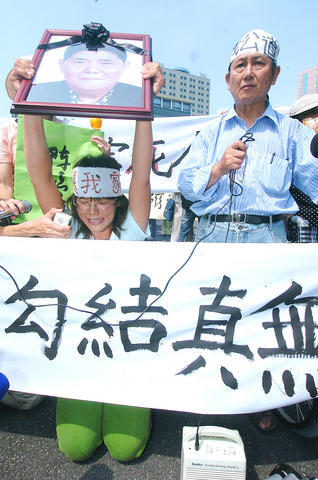More than 20 environmental protection activists petitioned the Executive Yuan yesterday, requesting the government lay out stricter measures regulating electromagnetic waves (EMW).
"The regulations governing EMW are not strict enough. Unfortunately, the government will not do anything about it," said Chen Jiau-hua (
"As there are an increasing number of cellphone towers, the electromagnetic waves are getting stronger in the environment. It is quite ridiculous that the government is now planning to establish more than 10,000 WiMAX towers before we have laws for EMW related issues," she added.

PHOTO: LIU HSIN-DE, TAIPEI TIMES
WiMAX stands for "worldwide interoperability for microwave access." It aims to provide wireless data over long distances, in a variety of different ways, from point to point links to full mobile cellular type access.
In its petition, the union submitted five requests.
It asked the National Communications Commission not to issue operating licenses for any WiMAX towers before the government guarantees that their EMW are harmless and requested that existing cellphone towers decrease their strength to six volts per meter.
Those aged 16 and below must not be allowed to use cellphones, the group suggested.
The group also asked the government to postpone the establishment of campus wireless Internet networks before the technology is proved to be harmless and relocate cellphone towers, power stations and high-voltage power line towers away from campuses, residential areas and hospitals.
The union provided a list of people who had died of cancers, which they alleged were related to EMW pollution.
The union said that the people lived close to Chianan Church in Chiayi City, which has a large cellphone tower on its roof.
The statistics provided by the group showed that 12 residents died of cancer between 2004 and this May.
"There is insufficient evidence to prove that these residents died from the effects of electromagnetism, but no one can guarantee that their cancer had nothing to do with it either," Chen said.

The Ministry of Economic Affairs has fined Taobao NT$1.2 million (US$36,912) for advertisements that exceed its approved business scope, requiring the Chinese e-commerce platform to make corrections in the first half of this year or its license may be revoked. Lawmakers have called for stricter enforcement of Chinese e-commerce platforms and measures to prevent China from laundering its goods through Taiwan in response to US President Donald Trump’s heavy tariffs on China. The Legislative Yuan’s Finance Committee met today to discuss policies to prevent China from dumping goods in Taiwan, inviting government agencies to report. Democratic Progressive Party Legislator Kuo Kuo-wen (郭國文) said

The Ministry of Economic Affairs has fined Taobao NT$1.2 million (US$36,900) for advertisements that exceeded its approved business scope and ordered the Chinese e-commerce platform to make corrections in the first half of this year or its license would be revoked. Lawmakers have called for stricter supervision of Chinese e-commerce platforms and more stringent measures to prevent China from laundering its goods through Taiwan as US President Donald Trump’s administration cracks down on origin laundering. The legislature’s Finance Committee yesterday met to discuss policies to prevent China from dumping goods in Taiwan, inviting government agencies to report on the matter. Democratic Progressive Party

Taiwan and its Pacific ally Tuvalu on Tuesday signed two accords aimed at facilitating bilateral cooperation on labor affairs, according to Taiwan’s Ministry of Foreign Affairs (MOFA). The governments inked two agreements in Taipei, witnessed by Foreign Minister Lin Chia-lung (林佳龍) and visiting Deputy Tuvaluan Prime Minister Panapasi Nelesone, MOFA said in a news release. According to MOFA, the agreements will facilitate cooperation on labor issues and allow the two sides to mutually recognize seafarers’ certificates and related training. Taiwan would also continue to collaborate with Tuvalu across various fields to promote economic prosperity as well as the well-being of their

Sung Chien-liang (宋建樑), who led efforts to recall Democratic Progressive Party (DPP) Legislator Lee Kun-cheng (李坤城), was released on bail of NT$80,000 today amid outcry over his decision to wear a Nazi armband to questioning the night before. Sung arrived at the New Taipei District Prosecutors’ Office for questioning in a recall petition forgery case last night wearing a red armband bearing a swastika, carrying a copy of Adolf Hitler’s Mein Kampf and giving a Nazi salute. Sung left the building at 1:15am without the armband and covering the book with his coat. Lee said today that this is a serious